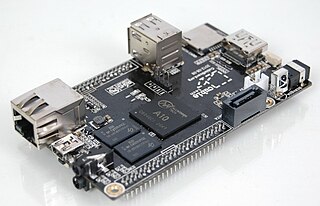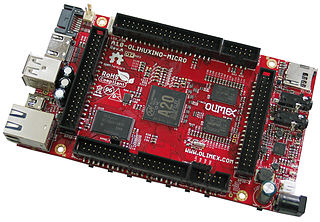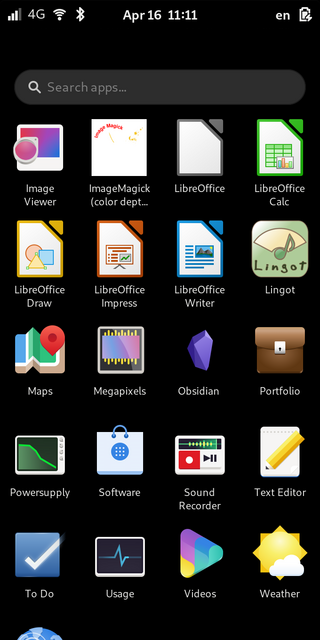
A laptop computer or notebook computer, also known as a laptop or notebook, is a small, portable personal computer (PC). Laptops typically have a clamshell form factor with a flat panel screen on the inside of the upper lid and an alphanumeric keyboard and pointing device on the inside of the lower lid, although 2-in-1 PCs with a detachable keyboard are often marketed as laptops or as having a "laptop mode". Most of the computer's internal hardware is fitted inside the lower lid enclosure under the keyboard, although many laptops have a built-in webcam at the top of the screen and some modern ones even feature a touch-screen display. In most cases, unlike tablet computers which run on mobile operating systems, laptops tend to run on desktop operating systems, which were originally developed for desktop computers.

A netbook is a small and inexpensive laptop designed primarily as a means of accessing the Internet. Netbooks were sold from 2007 until around 2013, when the widespread advent of smartphones and tablets eclipsed their popularity.

Subnotebook, also called ultraportable, superportable, or mini notebook, was a marketing term for laptop computers that are smaller and lighter than a typical notebook-sized laptop.
Jiangsu Lemote Tech Co., Ltd or Lemote is a computer company established as a joint venture between the Jiangsu Menglan Group and the Chinese Institute of Computing Technology, involved in computer hardware and software products, services, and projects.

Zonbu was a technology company that markets a computing platform which combines a web-centric service, a small form factor PC, and an open source based software architecture. Zonbu was founded by Alain Rossmann and Gregoire Gentil.
The Elonex ONE was a netbook computer marketed to the education sector by Elonex. The ONE's operating system was called Linos, based on Linux kernel 2.6.21, and the device had Wi-Fi connectivity, Ethernet networking, a solid-state hard drive, two USB ports and weighed less than 1 kg.
Video Decode and Presentation API for Unix (VDPAU) is a royalty-free application programming interface (API) as well as its implementation as free and open-source library distributed under the MIT License. VDPAU is also supported by Nvidia.
Rockchip is a Chinese fabless semiconductor company based in Fuzhou, Fujian province. Rockchip has been providing SoC products for tablets & PCs, streaming media TV boxes, AI audio & vision, IoT hardware since founded in 2001. It has offices in Shanghai, Beijing, Shenzhen, Hangzhou and Hong Kong. It designs system on a chip (SoC) products, using the ARM architecture licensed from ARM Holdings for the majority of its projects.

The Allwinner A1X is a family of single-core SoC devices designed by Allwinner Technology from Zhuhai, China. Currently the family consists of the A10, A13, A10s and A12. The SoCs incorporate the ARM Cortex-A8 as their main processor and the Mali 400 as the GPU.

Cubieboard is a single-board computer, made in Zhuhai, Guangdong, China. The first short run of prototype boards were sold internationally in September 2012, and the production version started to be sold in October 2012. It can run Android 4 ICS, Ubuntu 12.04 desktop, Fedora 19 ARM Remix desktop, Armbian, Arch Linux ARM, a Debian-based Cubian distribution, FreeBSD, or OpenBSD.

Allwinner Technology Co., Ltd is a fabless semiconductor company that designs mixed-signal systems on a chip (SoC). The company is headquartered in Zhuhai, Guangdong, China. It has a sales and technical support office in Shenzhen, Guangdong, and logistics operations in Hong Kong.

OLinuXino is an open hardware single-board computer capable of running Android or Linux designed by OLIMEX Ltd in Bulgaria.

Banana Pi is a line of single-board computers produced by the Chinese company Shenzhen SINOVOIP Company, its spin-off Guangdong BiPai Technology Company, and supported by Hon Hai Technology (Foxconn). Its hardware design was influenced by the Raspberry Pi, and both lines use the same 40-pin I/O connector.
Pine Store Limited, known by its trade name Pine64, is a Hong Kong-based organization that designs, manufactures, and sells single-board computers, notebook computers, as well as smartwatch/smartphones. Its name was inspired by the mathematical constants pi and e with a reference to 64-bit computing power.

The Surface Pro X is a 2-in-1 detachable tablet computer developed by Microsoft. It was developed alongside and was announced on 2 October 2019 alongside the Surface Pro 7 and Surface Laptop 3. Updated hardware was announced alongside Surface Laptop Go and Surface accessories on October 1, 2020 and September 22, 2021. The device starts at $899.99 USD / £849.99.

The PinePhone is a smartphone developed by Hong Kong-based computer manufacturer Pine64, intended to allow the user to have full control over the device. Measures to ensure this are: running mainline Linux-based mobile operating systems, assembling the phone with screws, and simplifying the disassembly for repairs and upgrades. LTE, GPS, Wi-Fi, Bluetooth and both cameras can be physically switched off. The PinePhone ships with the Manjaro Linux operating system using the Plasma Mobile graphic interface, although other distributions can be installed by users.

The PineTab is a low-cost tablet developed by Hong Kong-based computer manufacturer Pine64. The PineTab was announced in May 2020, with shipping beginning in September 2020. It is based on the platform of the existing Pine A64 single board computer, with the platform being used in related devices, such as the Pinebook and PinePhone.

The PinePhone Pro is a smartphone developed by Hong Kong-based computer manufacturer Pine64. The phone is the successor to the PinePhone released in 2019. The default operating system is Sailfish OS. The device is a developer platform with open hardware specifications but with unfinished software. The target group of the device is free and open-source software developers who will develop the software. The device was first shipped to developers in December 2021, and in February 2022 devices were made available to consumers.

Mobian is a project to port the Debian GNU/Linux distribution running the mainline Linux kernel to smartphones and tablets. The project was announced in 2020. It is available for the PinePhone, PineTab, Librem 5, OnePlus 6/6T and Pocophone F1. Droidian is a version of Mobian which runs top of Android's variant of the Linux kernel and the Libhybris and Halium adaptation layer, and works with devices which are supported by Ubuntu Touch. It can be installed using UBports installer.

















